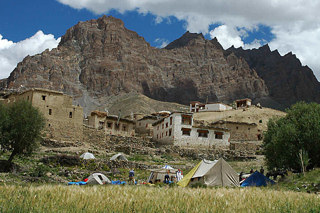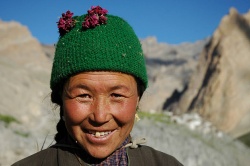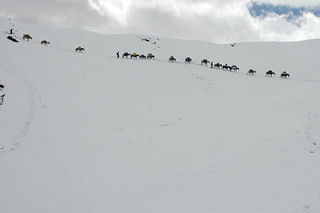MyHimalayasimpressions from |
|
|||||||

From Ladakh to Zanskar
Ancient Trails and Passes
Ladakh literally means "land of passes", and a local proverb states that "The land is so harsh and the passes so many only the best of friends or the worst of enemies would visit you."
 It is not just a romantic notion but an accurate description
of the rugged scenery. The southern part of Ladakh features
countless passes, and it is this area between Ladakh and Zanskar that
we picked for a three-week trek in summer 2006.
It is not just a romantic notion but an accurate description
of the rugged scenery. The southern part of Ladakh features
countless passes, and it is this area between Ladakh and Zanskar that
we picked for a three-week trek in summer 2006.
Small isolated settlements are connected by narrow trails that zig-zap up to passes, lead over wind-swept open spaces and disappear in narrow canyons, only to emerge again on top of yet another pass. We will cross over a dozen during our trek...
On the way to our first high pass, Sirsir La, the scenery opens up after a day in a narrow canyon, and we climb up a barren slope with fine views of the valley. The arid landscape at 4'200 meters is stunning. The colourful rocks in green, red, and black make the scenery even more interesting.
 The
few villages and their fields are visible from far away. The green barley
terraces are a great contrast to the inhospitable surroundings. The
local people seem to shrug off the adverse conditions easily; smiles greet us in every
village and people take a break from harvesting to invite us for tea and
Tibetan stew.
The
few villages and their fields are visible from far away. The green barley
terraces are a great contrast to the inhospitable surroundings. The
local people seem to shrug off the adverse conditions easily; smiles greet us in every
village and people take a break from harvesting to invite us for tea and
Tibetan stew.
After crossing the Zanskar river at Nyerak we spend three days in remote valleys that are rarely visited even by Zanskaris themselves. After a steep descent in a narrow valley we arrive on the plain near Zangla. The former kingdom was ruled from the fort that still watches over the village and the monastery.
Two more passes and we arrive in Lingshed, a large village whose monastery is home to a large community of monks. We stay an extra day to walk around the valley and visit the gompa.
 On
the way over the Singe La pass the weather gets bad. Snowfall keeps us in
Photaskar for a day, and transforms the character of the landscape. The
place seems wilder, the horizon further away, the valleys wider than before,
and the mountains higher.
On
the way over the Singe La pass the weather gets bad. Snowfall keeps us in
Photaskar for a day, and transforms the character of the landscape. The
place seems wilder, the horizon further away, the valleys wider than before,
and the mountains higher.
Two hours after the snowy Sirsir La pass we're in a different world of yellow barley fields and colourful flowers. We follow the river down to Wanla and experience a wonderful sunset from the ancient monastery that overlooks the fertile valley with its tall poplar trees. After a short walk to Lamayuru we reach the end of our trek and drive back to Leh.
The scenery was outstanding, local people very friendly, our route was diverse, the weather fine, our crew excellent, and my co-trekkers very nice. I can't believe how fast the last three weeks passed.
Part 2: Panjila to Photoskar
Part 3: Photoskar to Nyerak
Part 4: Nyerak to Zangla
Part 5: Zangla to Lingshed
Part 6: Lingshed Photoskar
Part 7: Photoskar Lamayuru
Video
Map Ladakh to Zanskar 3D
Pictures only
Text only
Outside sources of information:
Links
Books
Thanks to:
Kim and Joel from project-himalaya.com, Tenba and Phuntsok for delicious meals, Lobsang for being Lobsang, Andrea and Martin for joining and enjoying the trek.